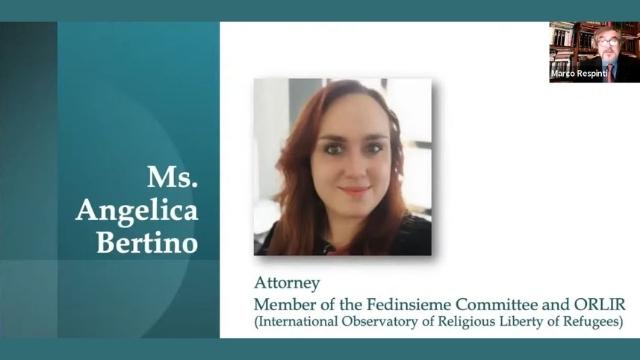Slander and the manipulation of the tax system are frequent tools used to persecute religious and spiritual groups. They need our solidarity.
by Angelica Bertino*
*A paper presented at the webinar “After 25 Years: Solidarity with Tai Ji Men,” co-organized by CESNUR and Human Rights Without Frontiers on December 21, 2021, after the 25th anniversary of the crackdown on Tai Ji Men (December 19, 1996) and the International Human Solidarity Day (December 20).

I am an Italian civil lawyer, member of the committee for inter-religious dialogue Fedinsieme (Faiths Together) and of the International Observatory of Religious Liberty of Refugees (ORLIR). I deal, among other things, with the international protection of political refugees and those persecuted for religious reasons.
I had the opportunity to study the judicial cases of the Tai Ji Men movement and of Dr. Hong, including the comments of Fedinsieme’s co-founder, Francesco Curto. While I fully agree with his comments about the violation of the fundamental principles of a legal system, which also apply to tax matters, the principle of equality and the principle of consistency, I would add some further remarks of my own.

In my work with the Fedinsieme committee and ORLIR, I have witnessed various forms of persecution of individuals and religious movements. Some of these forms are bloody, involving the use of violence, others involve the use of stratagems aimed at manipulating the public opinion (such as conveying false and disparaging information about the group or the persons targeted), others simply ban certain religious practices. These forms of persecution, as we all know, have a long history. If we go back to the Roman Empire, here in Europe, the persecution suffered by Christians immediately comes to mind. This persecution began, first, by spreading false information (about the so-called “nocturnal rites”), then by banning worship.

Since that time, many years have passed by, and social complexity has increased. We know that a State, wherever it is, needs an economic and financial system, supported by taxes, in order to live. Here then, in modern societies a new way of persecuting spiritual movements and their adherents has emerged. Modern societies have, in fact, learned that, if you want to denigrate, discredit, or stop somebody, all you have to do is to perform a tax audit and, through a creative interpretation of the activities of the taxpayer, give a new interpretation to the facts.
This is what has happened to the Tai Ji Men Movement and to Dr. Hong, who since December 19, 1996, have suddenly found themselves in a hellish circle, made of criminal charges based on lies or misrepresentation of facts, confiscation of property, and long court battles.
The giving of money through the ritual of “red envelopes” is a well-known mode of donating in Chinese culture, therefore, the alteration of the meaning and significance the public administration has operated on this ritual is nothing less than absurd.
From the documents I had the opportunity to study, I learnt that, fortunately for Dr. Hong and the Tai Ji Men Movement, even if in a partial way, justice was done. The recognition that for the years 1991, 1993, 1994, 1995, and 1996, the ritual of the “red envelopes” was referred to gifts and not to payment for services was an excellent achievement, bringing the right order to things.
That left, however, 1992, the year for which a ruling gave a different interpretation to the rite. As Francesco Curto said, there has been here a real violation of both the principle of equality and the principle of consistency.
But a question arises: why were these principles violated? And here we come back to the point I was making earlier about persecution.

I personally think it is essential to raise awareness of what is happening to the Tai Ji Men movement and Dr. Hong. And you have my full support and the support of Fedinsieme and ORLIR. December 20 was the “International Day of Human Solidarity,” a day established by the United Nations General Assembly in 2005, identifying “solidarity” as one of the fundamental and universal values that should underlie relations between peoples. Looking at what you are doing, mobilizing professionals around the world to speak out on your case, I think you have all the solidarity in the world in this battle of yours.
I know that your main aim is to spread the culture of peace in the world.
I believe there can be no nobler aim than this. But we know that this is an arduous path, not without obstacles. Selfishness and the exploitation of others for selfish purposes are the main obstacles to the realization of a world in which the culture of peace prevails.
A culture of peace does not presuppose a world in which conflicts are absent (because diversity implies the existence of conflicts), but a world in which conflicts are resolved in an enlightened way. I hope that you, or—better—we, can find an enlightened solution for the Tai Ji Men case.
Source: Bitter Winter
